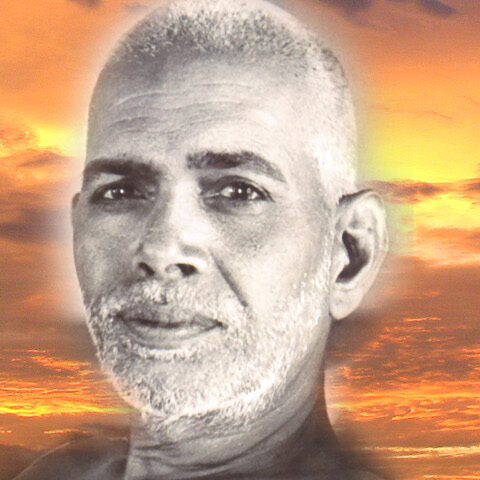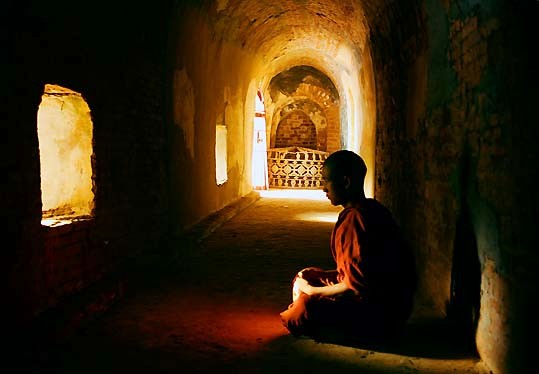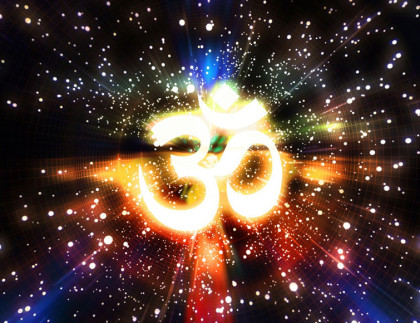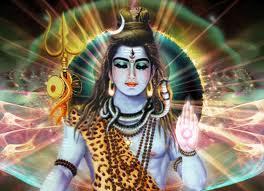Glossary 2

-
Sadhak
One who is engaged in spiritual practices. A spiritual seeker who practises meditation, austerities, worship etc. for spiritual advancement and self-improvement.
-
Sadhana
Practice -
Sadhana Chatushtaya
Four Means of practice (sadhana chatushtaya), which include Six Virtues (shatsampat). 1. Discrimination (viveka): Ability to discern the difference between the real and the unreal, permanent and the temporary, self and the not-self. 2. Non-attachment (vairagya): As a natural byproduct of discrimination, there is an decrease passions and material objects. 3. Six virtues (shat sampat): Six virtues to stabilize the mind and emotions for meditation. 1) Tranquility (shama): peace of mind or contentment. 2) Training (dama): Training of the senses. 3) Withdrawal (uparati): Inward turning away from the world. 4) Forbearance (titiksha): Forbearance and tolerance. 5) Faith (shraddha): An intense sense of certainty about one's path. 6) Focus (samadhana): Concentration in the pursuance the goal. 4. Longing (mumukshutva): An intense longing or desire for enlightenment and liberation from misery. Three stages of practice: 1) listening to the teachings (sravana), 2) reflecting on those teachings (manana), and 3) deep contemplative meditation on those principles (niddhidhyasana). -
Sadhu
In Sanskrit: Monk; Hermit; Renunciate. -
Sage
One who has attained Perfect Wisdom.
An Enlightened, Self-Realized Being.
Sri Ramana Maharshi
-
Salvation
In spirituality, it is the Liberation from Bondage caused by the illusory ego that one is limited and attached to the body, mind, intellect, desires, world etc. and realize that one is Unlimited Being.
-
Samadhi
A state of intense concentration and perfect tranquility achieved through meditation. In Hindu yoga this is regarded as the final stage, at which union with the divine is reached. Elucidation of Samadhi by Sri Ramana Maharshi:
Sleep Savikalpa Samadhi Kevala Nirvikalpa Samadhi Sahaja Nirvikalpa Samadhi (1) Mind Alive (1) Mind Alive (1) Mind Alive (1) Mind Dead (2) Sunk in Oblivion (2) Holding on to Reality with effort (2) Merged and Sunk in Light (2) Resolved into the Self (3) like a bucket with the rope left lying in the water in a well (3) Like a river discharged into the ocean and its identity lost (4) to be drawn out by the other end of the rope (4) A river cannot be redirected from the ocean 
-
Samsara
In the usual sense, Samsara means worldly life. In the spiritual sense, Saṃsāra (Sanskrit संसार) is the repeating cycle of birth, life and death (reincarnation) as well as one's actions and consequences in the past, present, and future in Hinduism. It refers to the bondage of the individual soul and the consequent miseries of the world.
-
Sanatana Dharma
Sanatana Dharma is the Eternal Way of Life in India. In India, ancient Sages who researched within and discovered the Truths of one's Real Being, passed it on to their disciples, who in turn passed it on to others. There is really no such thing as "Hinduism". It is just a fusion of Indian Cultures and Traditions, with no Founder.
 Aum or Om- Meaning: The All-Pervading Being which is the Beginning, Middle and End of all Beings
Aum or Om- Meaning: The All-Pervading Being which is the Beginning, Middle and End of all Beings
 Hindu Swastika Symbol - Meaning: Well-Being, Good Fortune
Hindu Swastika Symbol - Meaning: Well-Being, Good Fortune -
Sannyasin
A Mendicant; Ascetic; Monk; Hermit; Renunciate; one who has renounced the role of a householder and has turned his attention inward towards attaining Self-Realization.

-
Sanyasa
Life of a Monk; Renunciation; Giving up the life of a householder. -
Sarira
Body -
Sarvadhikari
~~~ Chief Manager, One who is in charge of everything in the organization.
-
Sastra
Sanskrit word that means "precept, rules, manual, compendium, book or treatise" in a general sense. The word is generally used as a suffix in the Indian literature context, for technical or specialized knowledge in a defined area of practice. -
Sat
Being; Existence; Truth; Reality
-
Sat-Chit-Ananda
Existence, Consciousness, Bliss. -
Sat-sang
~~~ 'Sat' means Reality. 'Sanga" means association with. In the highest sense, Sat-Sanga is the association of the individual with the Immortal Reality which is of the nature of Being, Awareness and Bliss. In the worldly practical sense, it means associating with not only the Higher Power, but a Great Sage or Enlightened Being, or Wise Beings. -
Sattwa
~~~ Sattva is a state of mind in which the mind is steady, calm and peaceful. Purity of heart, self-restraint, evenness of temper, tenderness towards all beings, fortitude and freedom from desire, hatred and arrogance are the outstanding virtues of the sattvic mind. In Vedantic philosophy, it one of the three qualities of prakriti, or nature, which are passion (rajas) dullness or inertia (tamas) and goodness or purity (sattva). -
Satvic
Purity of heart, self-restraint, evenness
of temper, tenderness towards all beings,
fortitude and freedom from desire, hatred
and arrogance are the outstanding virtues
of the sattvic mind.
Satvic is meant to be "pure, essential,
natural, vital, clean, wise, conscious
energy-containing, true, honest and wise".
Satvic food means simple and nutritious
food that sustains but does not stimulate
the body.
The Satvic diet regiment places emphasis
on seasonal foods, fruits, dairy products,
nuts, seeds, oils, vegetables, legumes,
whole grains, and non-meat based proteins. -
Self
Existence, Reality, without attributes. The emergence and disappearance of the world are like the spider producing a gossamer web and then withdrawing it. The spider here underlies all the three states - waking, dreaming, and sleep; such a spider in the person is called Atman (Self). The same with reference to the world (which is considered to issue from the sun) is called Brahman (Supreme Spirit). [caption id="attachment_2969" align="alignleft" width="300"] [/caption]
[/caption] -
Self-Realization
Knowing the Real, ever-present Self; Knowledge that one is not the sheaths that cover the Self, but the Real Being. -
Siddha
An accomplished Yogi; a perfected Master; one who has attained spiritual enlightenment. Siddha may also refer to one who has attained siddhi's (paranormal capabilities). It is believed that Siva always abides at the top of the hill on its northern side in the form of an invisible Siddha. -
Siddhi
Attainment; special spiritual power; occult power, Self-Realization.
-
Siddhis
Occult Powers. Involving or relating to supernatural, mystical, or magical powers or phenomena. Wizardry.
-
Sine qua non
An essential condition; a thing that is absolutely necessary.
-
Siva
~~~ Siva means "The Auspicious One". At the highest level, Shiva is regarded as limitless, transcendent, unchanging and formless. Siva also has many forms as one of the main Deities of Hinduism.
[caption id="attachment_3774" align="aligncenter" width="264"] Lord Shiva[/caption]
Lord Shiva[/caption] -
Sivaratri
The night dedicated to the worship of Lord Siva. -
Sonagiri
Sonagiri literally means "Golden Mountain". It stands for the Holy Arunachala. -
Sparsa
Touch -
Sravana
Sravana includes Listening to discourses and Reading the Scriptures and the Teachings of Sages and Gurus. Associating with the Wise Sages and learning about the practices and the qualifications needed to practice in order to gain Self-Realization. -
Sruti
Hindu Scriptures of India. It is also used to denote the Musical Key or Pitch in Music. -
Subhechcha
An earnest, noble desire ~~~
-
Sukshma
Subtle -
Sundara
Handsome Man -
Sundari
Beautiful Lady -
Surpassing Grandeur
The following verse is a well-known in India. "To think of Arunachala is to be assured of liberation." Such is the grandeur of the Arunachala Hill. -
Sushupti
One of the three states of existence. Sushupti is the Deep Sleep State. Swapna is the Dream State while Jagrat is the Waking State and Sushupti is the Deep Sleep State. -
Swapna
One of the three states of existence. Swapna is the Dream State while Jagrat is the Waking State and Sushupti is the Deep Sleep State.
Conversations with Ramana Maharshi are rare and priceless. He seldom wrote anything on his own accord. But out of His immense kindness and love, sometimes he answered questions from Devotees on Meditation, Devotion to God and Life. Reading them, contemplating on them and try to practice them are bound to offer great guidance to every true seeker of Real Happiness.
Sometimes Sri Ramana Maharshi used words in Sanskrit or devotional words and scriptural texts. This Glossary provides some insight into those.

